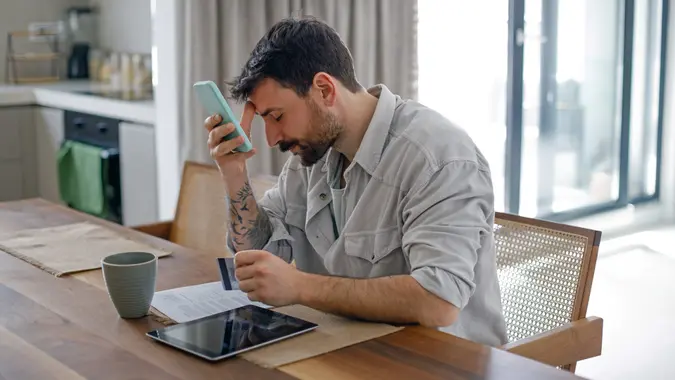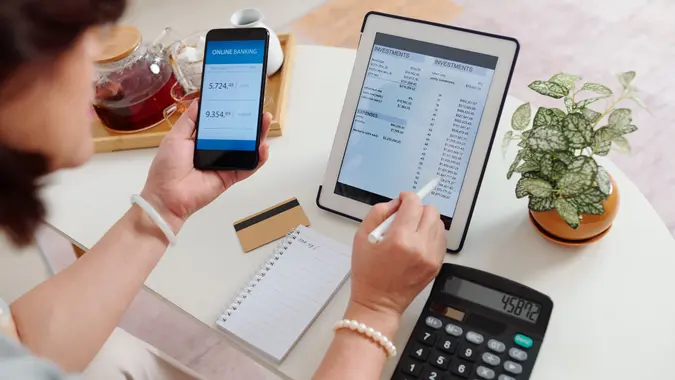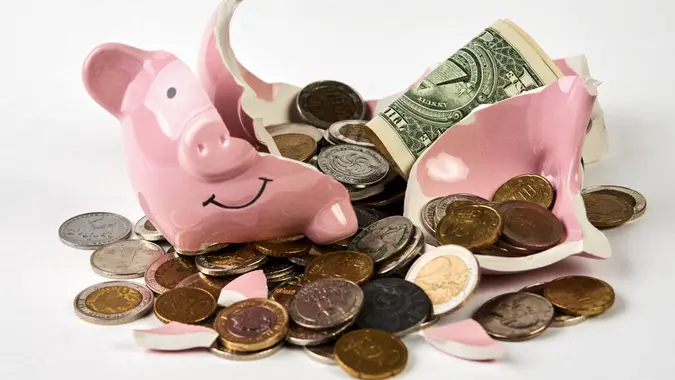When It’s Safe — or Not — To Share Your Banking Info

Commitment to Our Readers
GOBankingRates' editorial team is committed to bringing you unbiased reviews and information. We use data-driven methodologies to evaluate financial products and services - our reviews and ratings are not influenced by advertisers. You can read more about our editorial guidelines and our products and services review methodology.

20 Years
Helping You Live Richer

Reviewed
by Experts

Trusted by
Millions of Readers
Have you ever been asked for your checking account number or bank’s routing number? Maybe it was for a wire transfer or to set up direct deposit. Whatever the case, it’s generally okay to share your bank details when the source is reputable and legitimate.
But you’ll want to be careful or you could end up getting scammed out of your money — or becoming the victim of fraud. And fraud is no joke. According to the FTC, fraud contributed to $12.5 billion in total losses in 2024 alone. So, when is it safe to share your bank info? What info’s fine to share and with whom? Below is what you should know.
Also here’s how to use bank data to save more and spend less.
When It’s Safe To Share Your Bank Info
There are times when you simply need to share your banking details — like when you want to set up direct deposit with your employer, pay bills online or wire money for a down payment on a house.
Just be cautious about how you go about it.
“You should only provide information to entities you have verified and trust via secure channels,” said Darius Kingsley, head of consumer banking practices at Chase Bank.
If you can’t tell right off the bat that an entity is reputable or safe, you can do some extra research. To start, look into their security measures.
“You’ll only want to share info when it’s through an official website that’s encrypted or a verified phone number,” said Jake Rhees, vice president of operations at Wasatch Peaks Credit Union.
When You Probably Shouldn’t
If someone requests your banking details via text or email, don’t respond. It could be a scam. You should also generally avoid requests for info via links — always go through the official channels.
Essentially, any unsolicited requests for your personal bank info should be treated with extreme caution — even if it’s supposedly from your bank or credit union.
“If you’re not sure if the source is legitimate, you’ll want to verify by contacting your bank or credit union directly,” Rhees said. “You’ll also want to be on the lookout for red flags. Things like strange links or poor grammar can indicate an unsafe source.”
And if the request for your information feels urgent, like you need to respond right away, that could also be a sign of a scam.
“Be suspicious of any calls or texts you receive claiming to be your bank, especially if they ask for personal information or claim there is an urgent problem,” Kingsley said. “Banks will not call and ask for your passwords or personal information. Immediately hang up and call the number on the back of your bank card.”
What Info Can You Share?
So, which information is safe to share? And who can you share it with?
Things like your bank name, branch location and routing number are usually safe to share. They’re more or less public information (though that doesn’t mean you should just give this info out to anyone who asks).
You can also share your account number, but only if you’ve verified the person requesting them. You’ll generally need this info — along with your routing number — to write a check or set up direct deposit.
Be extra cautious with more personal details, though.
“You’ll only want to share the following information with verified and trusted sources: account number, online banking login info, debit or credit card details, personal info linked to your account like a pin and one-time codes,” Rhees said.
Even then, if you’re being asked for this information, make sure you know why. Providing certain personal details related to your account, for example, might be necessary if you’ve been locked out of your online account — but only if you’re the one who called the bank making the request. If someone calls you, that’s a problem.
 Written by
Written by  Edited by
Edited by 

























